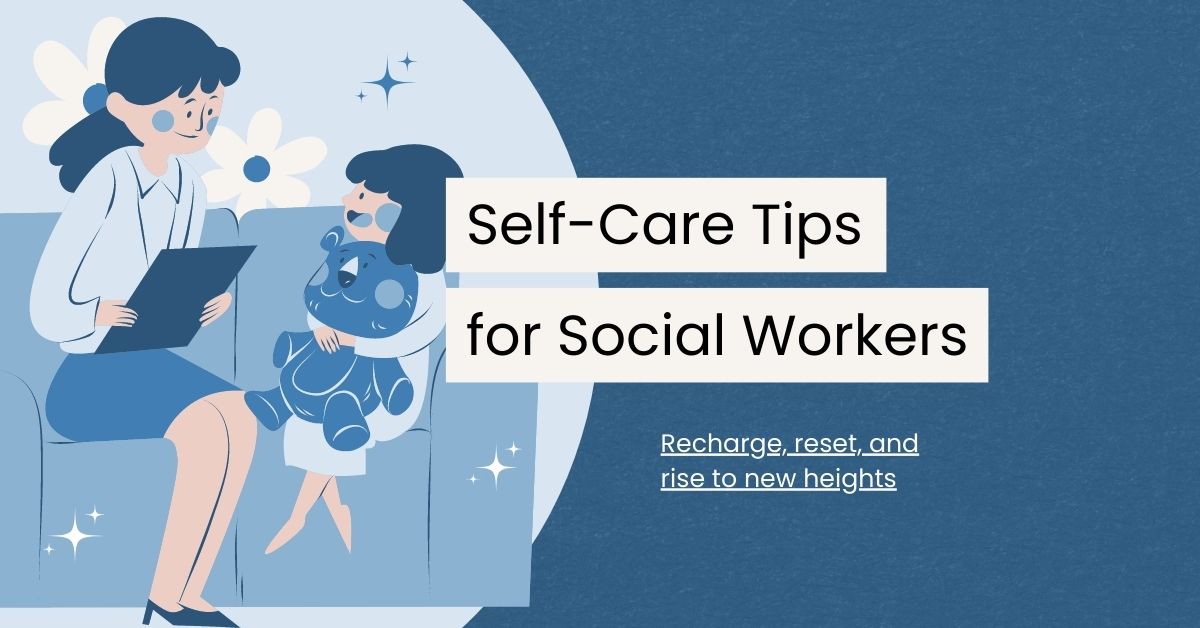Last Updated on August 13, 2023
Hey there, social warrior.
Let’s dive straight into a conversation that’s long overdue – the one about you.
Yes, you, the tireless advocate, the fierce protector of the vulnerable, the one who carries the weight of the world on their shoulders.
Amidst the chaos of caseloads, the intensity of emotions, and the pressure to create change, have you ever found yourself wondering, “When was the last time I truly took care of myself?”
I’m here to tell you that self-care isn’t a luxury; it’s an absolute necessity.
It’s not about neglecting your responsibilities; it’s about making sure you’re equipped to handle them with strength and compassion.
So, grab a cup of coffee, find a comfy spot, and let’s dive into the world of self-care for social workers – a practical guide to help you recharge, reset, and rise to new heights.
The Concept of Self-Care for Social Workers
Before we get into the nitty-gritty, let’s address the elephant in the room – the myth that self-care is selfish.
I’m here to shatter that notion once and for all.
Repeat after me: self-care is not selfish.
In fact, it’s the most selfless thing you can do.
As a social worker, you’re accustomed to putting others first.
But here’s the thing – taking care of yourself isn’t a betrayal of your mission; it’s an enhancement of it.
When you prioritize your own well-being, you’re better equipped to advocate, support, and effect change.
Why Should You Practice Self-Care?
Now, let’s talk about what you stand to gain from embracing self-care.
Imagine a version of you that’s mentally resilient, emotionally centered, and physically energized.
How would that impact your ability to create positive change in the lives of those you serve?
Let’s break it down:
- Clearer Mind: Self-care gives your brain the space it needs to function at its best. When you’re well-rested and balanced, you make decisions with clarity and finesse.
- Emotional Strength: Social work is emotionally demanding. Self-care equips you to process your own emotions and manage the emotional intensity of your work with grace.
- Physical Resilience: Engaging in self-care activities boosts your physical health, ensuring you have the stamina to navigate the demands of your role.
- Investment in Joy: Your happiness matters. Self-care allows you to infuse joy and positivity into your life, which in turn spills over into your interactions with others.
- Enhanced Relationships: When you’re in a good place mentally and emotionally, your relationships thrive. Your clients, colleagues, and loved ones benefit from your grounded presence.
Self-Care for Social Workers: Tips You Can Apply
Okay, now that we’re on the same page about the importance of self-care for social workers, let’s get practical.
Here are straightforward tips and strategies that fit seamlessly into your busy life:
1. Shift Your Mindset
Create a mindset where taking care of yourself is a priority, not a guilty pleasure. Think of it as an essential ingredient in your recipe for success.
2. Master Your Time
Your schedule might seem like a chaotic puzzle, but there are hidden moments waiting to be claimed.
Identify those time gaps – even if they’re just a few minutes – and use them for self-care.
It’s not about the length of time; it’s about making the most of what you have.
3. Delegate Wisely
Recognize that asking for help isn’t a sign of weakness; it’s a smart move.
Remember, you’re not a one-person army.
Delegate tasks that others can handle, whether it’s involving your team, family, or friends.
By lightening your load, you create space for self-care.
4. Connect with Peers
Social work can be isolating, but you’re not alone in this journey.
Seek out a support network of fellow social workers who understand your challenges and triumphs.
Whether it’s an online community or a local group, these connections can provide validation, advice, and a safe space to share.
5. Rediscover Joy
Self-care doesn’t need to be extravagant.
Engage in activities that bring a smile to your face. It could be as simple as reading a book, dancing to your favorite tunes, or trying out a new recipe.
Reconnecting with things that bring you joy injects positivity into your routine.
6. Embrace Flexibility
Let’s face it, life is unpredictable.
Embrace the idea that your self-care routine doesn’t need to be rigid.
Sometimes plans change, and that’s okay. Be adaptable and willing to adjust your self-care practices based on what each day brings.
7. Unplug and Recharge
The digital world can be overwhelming so dedicate moments in your day to disconnect from your devices.
Use this time to be fully present – whether it’s enjoying a quiet cup of tea, taking a leisurely walk, or just enjoying the peace of the moment.
8. Practice Mindfulness
Mindfulness doesn’t have to be complicated.
Take a few minutes each day to ground yourself. Focus on your breath, engage in meditation, or simply observe the world around you.
This practice can help you manage stress and stay centered.
9. Set Boundaries
As a social worker, you have a big heart and a strong desire to help.
However, saying yes to everything can lead to burnout.
Learn to set healthy boundaries and say no when necessary.
Remember, setting limits is about preserving your energy and maintaining your well-being.
10. Express Creativity
Creativity is a fantastic outlet for self-expression and stress relief.
Engage in creative activities that resonate with you – whether it’s painting, writing, crafting, or playing a musical instrument.
Letting your creativity flow enhances your overall sense of well-being.
11. Prioritize Sleep
Sleep isn’t a luxury; it’s a necessity.
Establish a bedtime routine that promotes quality sleep.
Create a calming environment, avoid screens before bed, and give yourself the rest your body needs to function optimally.
12. Laugh Often
Laughter truly is a form of medicine.
Engage in activities that make you laugh – watch a funny movie, read a humorous book, or spend time with people who bring joy to your life.
Laughter releases endorphins and boosts your mood.
13. Cultivate Gratitude
Start a gratitude journal to shift your focus toward the positive aspects of your life.
Each day, jot down things you’re thankful for.
This practice can reframe your perspective and foster a sense of contentment.
14. Nourish Your Body
Your body is your vessel, and taking care of it is an act of self-love.
Eat balanced meals, stay hydrated, and fuel yourself with nutritious foods that provide the energy you need to navigate your demanding role.
15. Stay Active
Movement is a powerful tool for both your body and mind.
Engage in physical activities you enjoy, whether it’s practicing yoga, going for a walk, or dancing to your favorite music.
Regular movement boosts your mood and overall well-being.
16. Be Kind to Yourself
Social work can be emotionally taxing so be as compassionate toward yourself as you are to others.
Acknowledge your efforts and give yourself permission to rest when needed.
17. Nature Therapy
Spending time in nature can be incredibly rejuvenating.
Whether it’s a walk in the park, a hike, or simply sitting outside, the fresh air and natural surroundings have a calming effect on your well-being.
18. Schedule ‘Me Time’
Block out time in your calendar for yourself.
Honor this time with the same dedication you give to your work and responsibilities.
These strategies are designed to fit seamlessly into your life, recognizing the demands of your role as a social worker.
Remember, self-care is an ongoing journey, and by prioritizing it, you’re not only enhancing your own well-being but also the impact you have on the lives you touch.
Personalizing Your Self-Care Journey
Now comes the fun part – personalization.
Tailor your self-care routine to match your preferences and needs:
- Embrace Your Style: Self-care is not one-size-fits-all. Do what resonates with you, whether it’s spending time alone or connecting with others.
- Nature vs. Nurture: Discover what revitalizes you – whether it’s spending time in nature or indulging in creative pursuits.
- Experiment and Evolve: Self-care is a journey of exploration. Try different activities, and don’t be afraid to evolve as you discover what works best for you.
By prioritizing self-care, you’re not only supporting yourself but also elevating the impact you have on the lives you touch.
Final Thoughts on Self-Care for Social Workers
Remember, this isn’t about being selfish; it’s about being strategic. The world needs you at your best, and that starts with taking care of you.
So, what are you waiting for?
Dive into this self-care journey like the rockstar you are. Your future self – and the lives you touch – will thank you.






